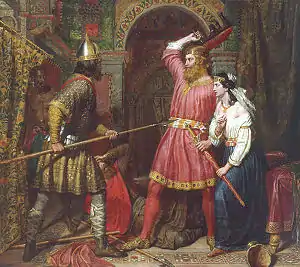572
Year 572 (DLXXII) was a leap year starting on Friday (link will display the full calendar) of the Julian calendar. The denomination 572 for this year has been used since the early medieval period, when the Anno Domini calendar era became the prevalent method in Europe for naming years.
| Millennium: | 1st millennium |
|---|---|
| Centuries: | |
| Decades: | |
| Years: |
| 572 by topic |
|---|
| Leaders |
|
| Categories |
|
| Gregorian calendar | 572 DLXXII |
| Ab urbe condita | 1325 |
| Armenian calendar | 21 ԹՎ ԻԱ |
| Assyrian calendar | 5322 |
| Balinese saka calendar | 493–494 |
| Bengali calendar | −21 |
| Berber calendar | 1522 |
| Buddhist calendar | 1116 |
| Burmese calendar | −66 |
| Byzantine calendar | 6080–6081 |
| Chinese calendar | 辛卯年 (Metal Rabbit) 3268 or 3208 — to — 壬辰年 (Water Dragon) 3269 or 3209 |
| Coptic calendar | 288–289 |
| Discordian calendar | 1738 |
| Ethiopian calendar | 564–565 |
| Hebrew calendar | 4332–4333 |
| Hindu calendars | |
| - Vikram Samvat | 628–629 |
| - Shaka Samvat | 493–494 |
| - Kali Yuga | 3672–3673 |
| Holocene calendar | 10572 |
| Iranian calendar | 50 BP – 49 BP |
| Islamic calendar | 52 BH – 51 BH |
| Javanese calendar | 460–461 |
| Julian calendar | 572 DLXXII |
| Korean calendar | 2905 |
| Minguo calendar | 1340 before ROC 民前1340年 |
| Nanakshahi calendar | −896 |
| Seleucid era | 883/884 AG |
| Thai solar calendar | 1114–1115 |
| Tibetan calendar | 阴金兔年 (female Iron-Rabbit) 698 or 317 or −455 — to — 阳水龙年 (male Water-Dragon) 699 or 318 or −454 |

Events
Byzantine Empire
- Byzantine–Sassanid War of 572–591: Emperor Justin II refuses to pay the annual tribute to Khosrau I, putting an end to the 50-year peace treaty established ten years earlier. The Armenians are considered allies to the Byzantine Empire, and Justin sends a Byzantine army into Persian territory, besieging the fortress city of Nisibis (modern Turkey).[1]
Europe
- Siege of Pavia (569–572): King Alboin captures Ticinum (Pavia); after a siege the Byzantine garrison surrenders to the Lombards. The city is of strategic importance, lying at the rivers Po and Ticino, and becomes the capital of the Kingdom of the Lombards.
- June 28 – Alboin, king of the Lombards, is murdered at Verona in his palace, at the instigation of his wife Rosamund (daughter of the Gepid king Cunimund), and her henchman, Helmechis (the king's squire); both flee to seek Byzantine protection in Ravenna. Alboin is succeeded as king by Cleph, who is not related by blood.
Britain
- Theodric succeeds his brother Æthelric as king of Bernicia (southeastern Scotland). He rules until 579.
Asia
- Taspar Qaghan succeeds his brother Muqan Qaghan as ruler (khagan) of the Turkic Khaganate (Central Asia).
- Bidatsu succeeds his father Kinmei and ascends to the throne of Japan as the 30th emperor.
Births
- Chen Shuda, Chinese statesman
Deaths
- June 28 – Alboin, king of the Lombards
- Æthelric of Bernicia, Scottish king
- Báetán mac Muirchertaig, High King of Ireland
- Corippus, Byzantine epic poet (approximate date)
- Eochaid mac Domnaill, High King of Ireland
- Hulü Guang, general of Northern Qi (b. 515)
- Liuva I, king of the Visigoths (or 571)
- Muqan Qaghan, ruler of the Göktürks
- Waldrada, Lombard princess (b. 531)
- Wei Shou, Chinese author (b. 506)
- Yuwen Hu, regent of Northern Zhou (b. 515)
- Sky Witness, ruler of Calakmul
References
- Frye, Richard N. (1983). The History of Ancient Iran.
This article is issued from Wikipedia. The text is licensed under Creative Commons - Attribution - Sharealike. Additional terms may apply for the media files.